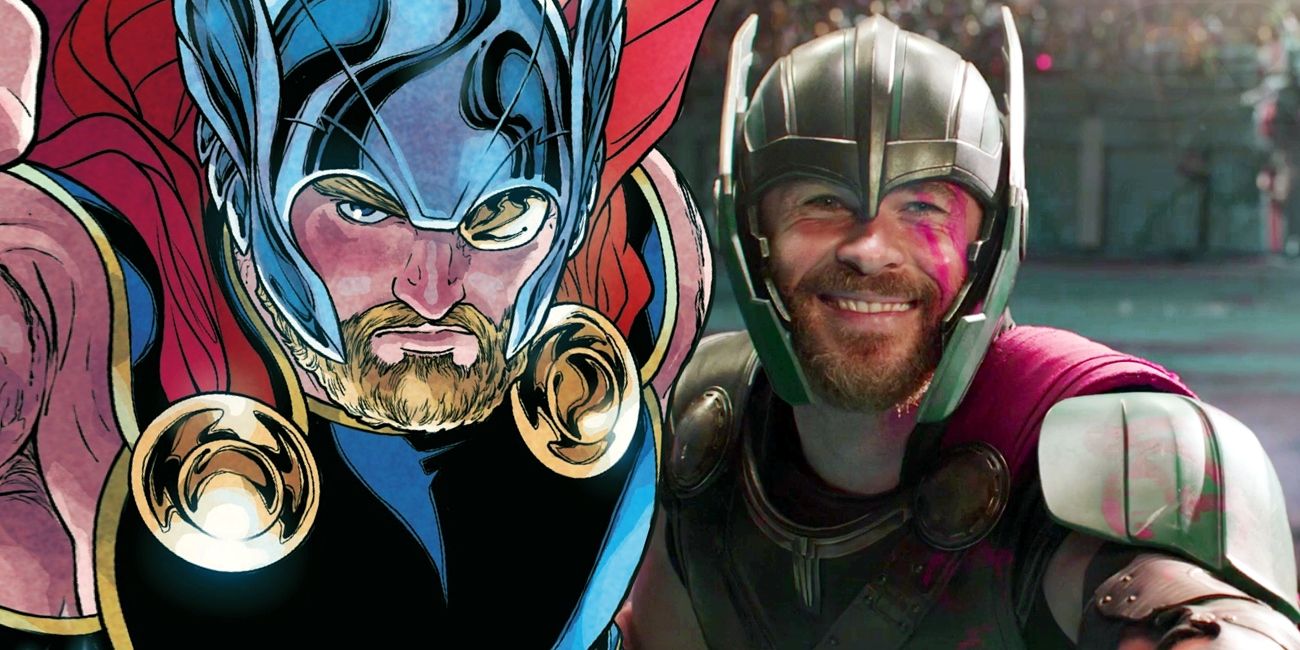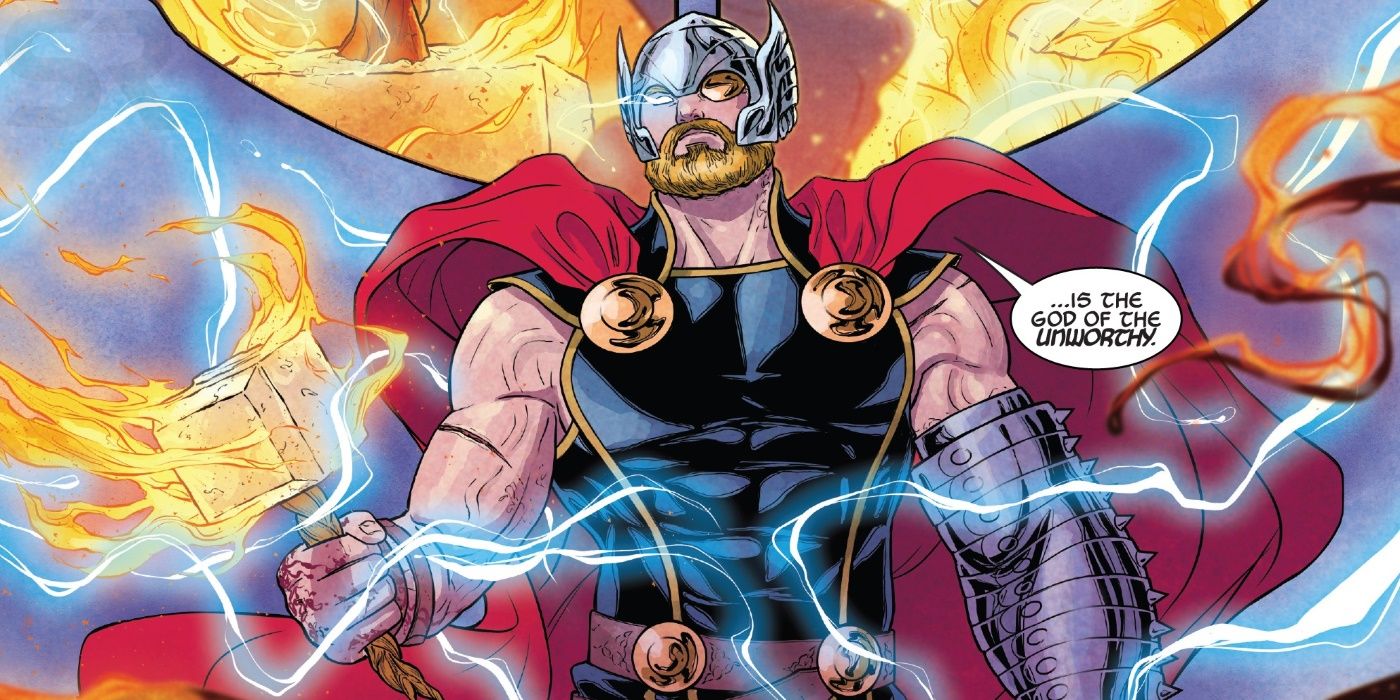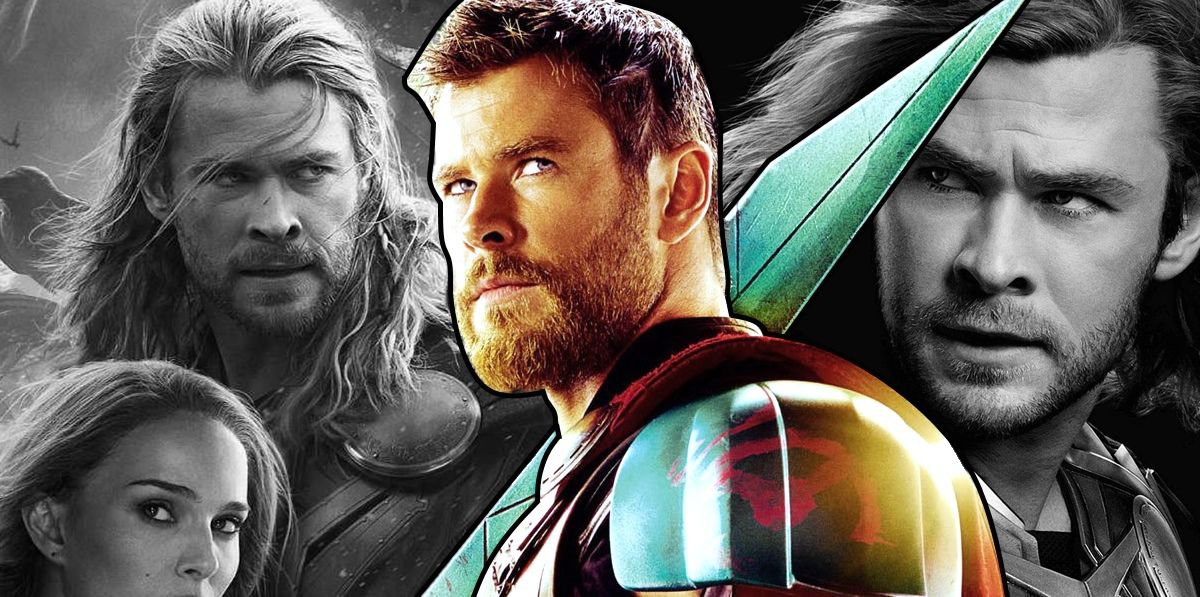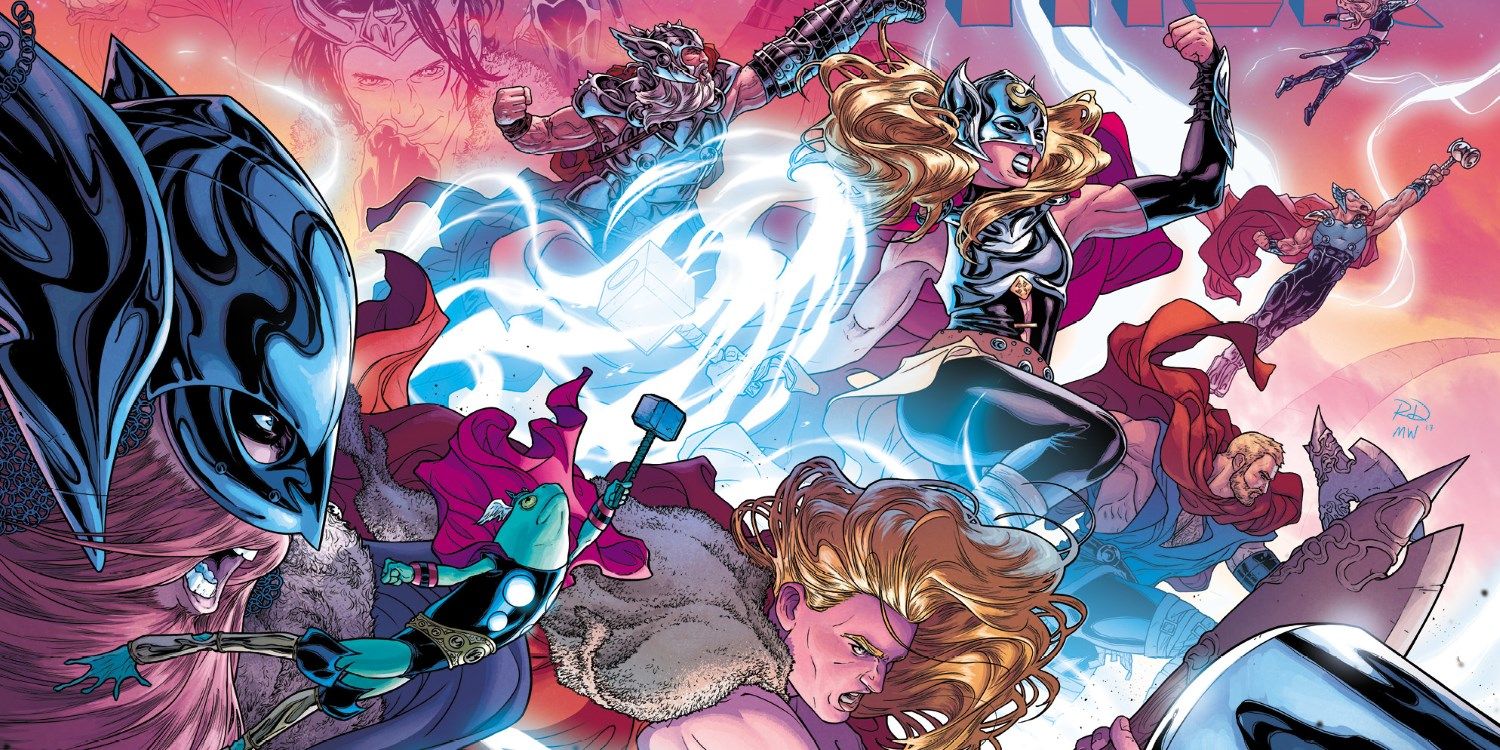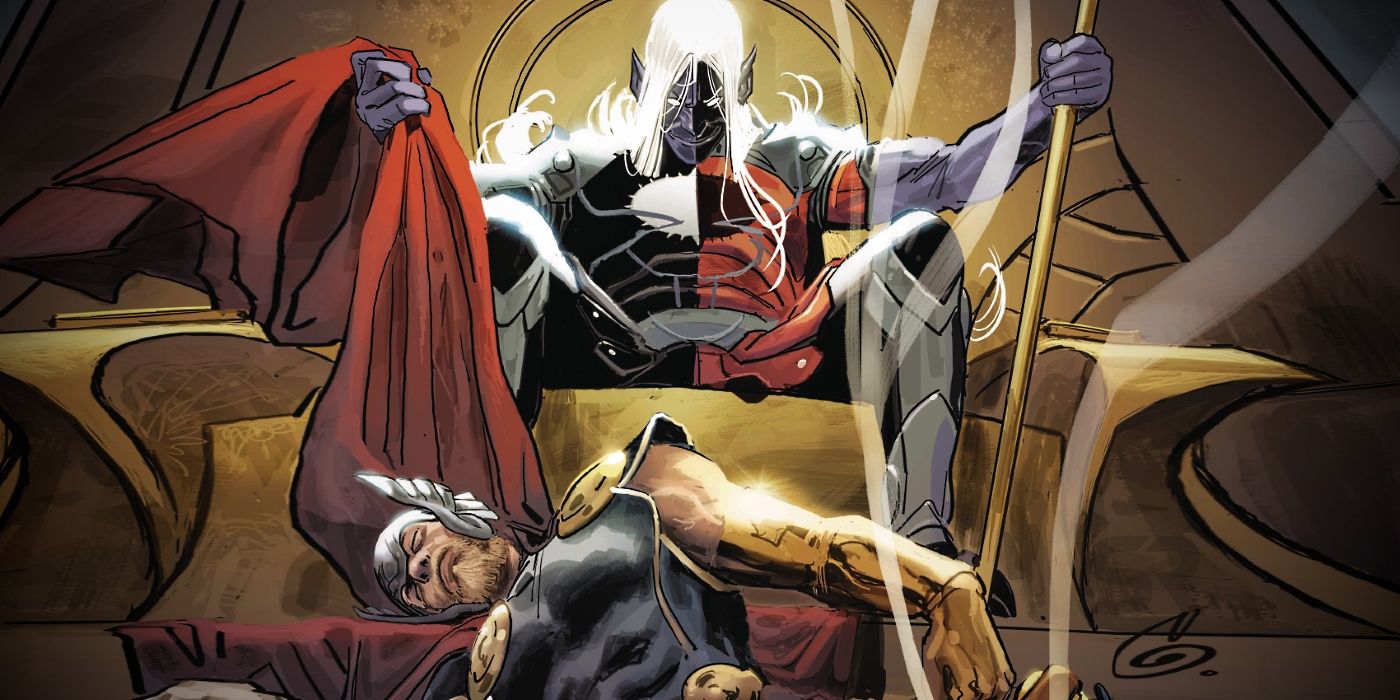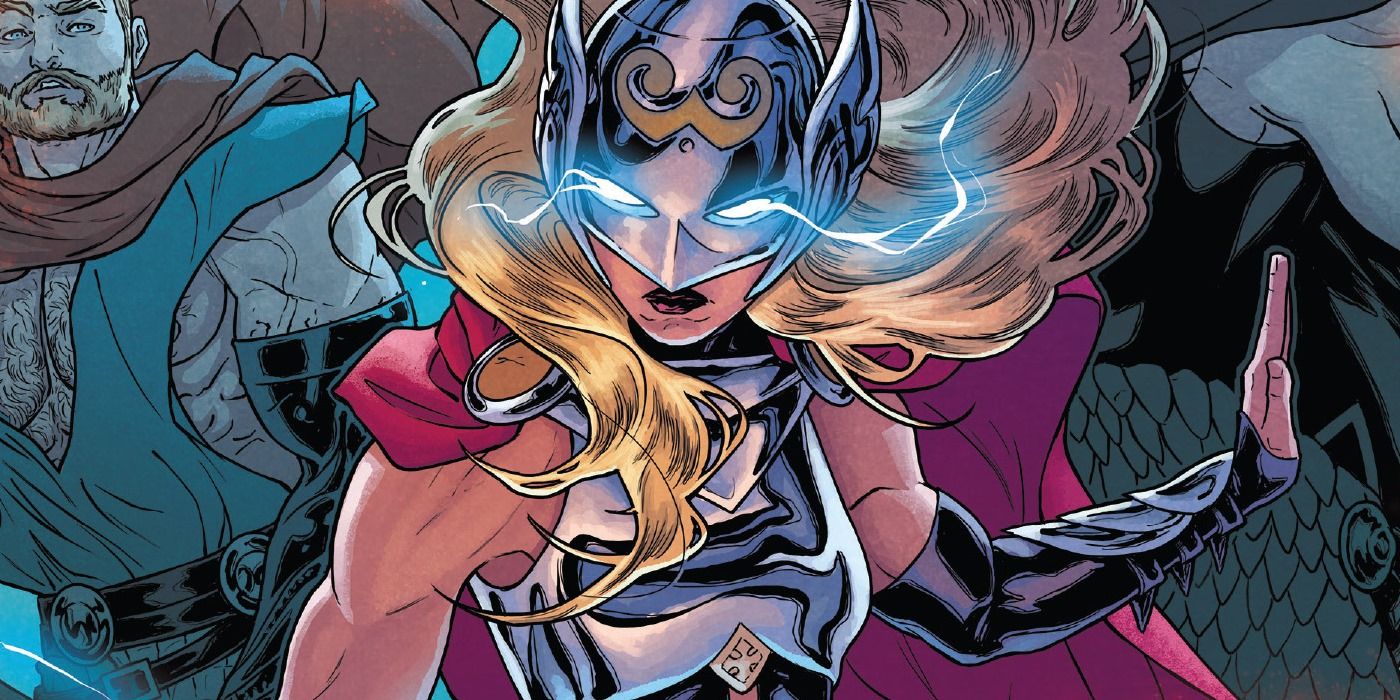The Marvel movies may be blockbusters, but the comics just delivered one of the best events in years with The War of The Realms... and in the process, showed exactly why The MCU has completely wasted the entire Thor franchise.
It isn't the first time that an Asgardian threat has become the main event in Marvel's Universe, but the War of the Realms told across sixty issues of tie-ins is handled like few crossovers before it, allowing an opportunity to re-examine beloved heroes and villains in the context of a war of the gods. There are too many incredible, but pitch perfect moments to call out--Spider-Man communing with Pegasus of the Valkyrie, and even Daredevil replacing Heimdall, to name just a few. But through it all, there was no question who stood at the center of it all.
The All-Father Thor, King of Asgard, and God of the Unworthy. The bad news? It reminded readers that the MCU has wasted the potential of Thor, Asgard, Jane Foster, Mjolnir... and there is simply no way anything like Jason Aaron's epic story could ever happen in Marvel's movie universe.
The MCU's Thor Could Never Be This Epic
It's no secret that Marvel Studios has never been entirely sure what to do with Thor. When Marvel launched the franchise back in 2011, they were unsure of whether or not the God of Thunder and Immortal Asgard would be fit into a shared cinematic universe built on a bedrock of pseudo-science. Director Kenneth Branagh held to his vision, but Thor still had to explain to Jane Foster that he comes from a realm where "science and magic are one and the same." It was a subtle nod to Arthur C. Clarke's First Law, that "any sufficiently advanced technology is indistinguishable from magic." Marvel's gotten more relaxed over the years, but that's made Thor's arc wildly inconsistent.
Take the first, and most obvious question: where does Thor's power come from? In Thor, Odin strips his son of his abilities and binds them to Mjolnir, meaning Thor can only regain his powers once he's proven worthy of them. Fast-forward to Thor: Ragnarok, when Mjolnir is shattered, only for Odin to later reveal he never needed the hammer in the first place--it was just a channel, helping him control it. "Are you the god of hammers?" Odin even quipped, in a mystical experience. And yet, suddenly, Avengers: Infinity War ditches those lightning powers completely until Thor gets a new weapon. Looked at through a critical eye, there are so many detours and redirects, it shows Marvel still hasn't grasped a clear idea of Thor (and fans have gotten used to it).
This all explains why Marvel chose Taikia Waititi to essentially reboot Thor in Ragnarok. Waititi ditched the "Shakespeare in the Park" feel, instead going for a much more comedic vibe. Chris Hemsworth loved it, delighting in the opportunity to demonstrate his comedic skills. And Avengers: Endgame committed to the idea, with Thor dropping his divine right and duty to safeguard New Asgard, instead heading off with the Guardians of the Galaxy.
After shifting to full-blown action comedy, it made sense for Endgame co-director Joe Russo to describe Thor as closer to the Guardians: "It just seemed like… well, where does a lost soul like that go? That’s basically what the Guardians are — a collection of lost souls."
But one thing is for sure: this misfit version of Odinson could never be the Thor used as the anchor of a story like Marvel's War of The Realms. In Jason Aaron's epic, Thor is the one hero who turns the tide; not just because of his power, but because of his leadership skills and inspirational character. When the war breaks out, Thor is the one the Avengers must find and rescue. Thor is the only one who can step forward with a plan. He isn't played for comedy (and hasn't been for the entirety of Aaron's acclaimed run), and as a result emerges as the most powerful and significant of all the Avengers... which he obviously should be. By the end of the event, Thor has demonstrated his worthiness on an unprecedented scale, and earns even Odin's loyalty as Asgard's new king, All-Father Thor.
The MCU Erased Thor's Cycle of Death & Rebirth
It can't be overlooked that the MCU has never really embraced the Asgardian mythology, either. Take the concept of Ragnarok: in the comics, Thor learned the gods are trapped in an endless cycle of death and rebirth (he isn't the 'first' Thor, for example). In contrast, the MCU envisions Ragnarok as a one-off event. Just as the universe moves towards heat death, so Odin cautions his son that all things move towards Ragnarok. In other words, every story must come to a permanent end. That means secondary characters like the Warriors Three are gone for good, playing by mortal rules. Volstagg can't be chosen as the War Thor, forget remotely pilot the Asgardian Destroyer against an army of Dark Elves.
It also means that Asgard itself is gone. The Realm Eternal was beautiful and exciting in 2011's Thor... flat and disappointing in Thor: The Dark World, and ultimately destroyed in Thor: Ragnarok. Unsurprisingly, Taika Waititi admitted he wasn't inspired by comics for Thor: Ragnarok, beginning with Asgard itself: "I wasn’t really that keen on what Asgard looks like. It’s completely made of gold, it’s just full of nerds and scholars. Doesn’t seem like a party town, doesn’t seem like my kind of party town." His distaste showed through in the way Asgard was destroyed, complete with a line of dialogue turning its total annihilation into a punchline.
Without that cycle of death and rebirth, there is no going back to the sprawling fantasy of the Nine Realms. Asgard is gone. After Avengers: Infinity War, Eitri is the only Dwarf alive in Nidavellir. The Dark Elves have been wiped out. So no matter how much War of The Realms impresses readers, it actually cannot happen.
Malekith & Jane Foster Were Both Wasted
Finally, we arrive at some of the major characters of the War of The Realms event, beginning with the villain who may be the most wasted, in terms of potential, of any MCU antagonist. In the comics, Malekith the Dark Elf acts as the mastermind of the entire war, spreading across all Ten Realms. A wrathful, venomous, malevolent figure who desires nothing but conquest and blood. Compare him to the version introduced in Thor: The Dark World, and Christopher Eccleston's Malekith is a one-dimensional villain whose motives--restricted to "turn the universe dark"--are impossible to connect with.
RELATED: Jane Foster's Death as Thor Makes The MCU Version Even Worse
Eccleston was originally interested in Malekith because of scenes that fleshed him out as a character, including one in which his nickname "The Accursed" was explained, but all these moments wound up dropped from the script and left on the cutting room floor. Malekith died as one of the MCU's least-developed villains, played by an actor who clearly hated the part he was playing. And unlike Ronan the Accuser, there's not even story potential to do prequels or future appearances to repair the damage.
And then... there's Jane Foster, the greatest Thor to lift the first Mjolnir. An important element of Jason Aaron's run on the series, Jane was promoted from being a background love interest of the Odinson to an epic incarnation of the god of thunder. She proved herself worthy of Mjolnir's power because she understood that the world would always need a Thor. In the end, she was even willing to pay the ultimate price to give the Realms their champion. Her story eventually revealed that Jane was dying of cancer, and that every time she magically transformed into Thor, the effects of her chemotherapy were nullified, allowing her cancer to spread. Naturally, Jane became Thor to save Asgard, and died as a result.
Contrast this with Natalie Portman's Jane Foster, as depicted in the first two Thor movies (and archived footage used in Endgame). The character introduced in Thor bears little to no resemblance to the comics; Marvel Studios even switched her profession, making her an astrophysicist instead of a nurse--but a "love interest" above all else. That would go on to inform her poor portrayal in Thor: The Dark World, being injected with an Infinity Stone just to make her relevant to the plot. When behind-the-scenes conflicts between Portman and Marvel Studios escalated, Jane was written out of Thor's life altogether. The relationship seems to have improved a little, but in spite of Kevin Feige's occasional comments, it's hard to imagine Portman returning to the MCU, let alone getting the unforgettable story of the comics.
--
Of course, Marvel has gotten some things right. Tom Hiddleston's Loki is one of the studio's biggest success stories, to the extent that the comics have basically mimicked Hiddleston's portrayal. But considering everything else, and where Avengers: Endgame sends Hemsworth's hero, it's hard to imagine the Thor franchise ever building up to something even close to a War of The Realms on the big screen. Too many opportunities have been missed, too many characters killed off, too much potential cast aside for comedy. Which means this is one area where the comics will forever exceed the movies.

